

Language Development in Early Childhood. There is perhaps nothing more remarkable than the emergence of language in children.
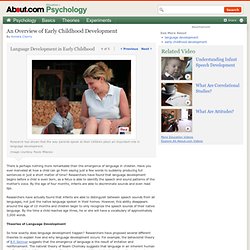
Have you ever marveled at how a child can go from saying just a few words to suddenly producing full sentences in just a short matter of time? Researchers have found that language development begins before a child is even born, as a fetus is able to identify the speech and sound patterns of the mother's voice. By the age of four months, infants are able to discriminate sounds and even read lips. Researchers have actually found that infants are able to distinguish between speech sounds from all languages, not just the native language spoken in their homes. However, this ability disappears around the age of 10 months and children begin to only recognize the speech sounds of their native language. Theories of Language Development So how exactly does language development happen? 4.1 child language acquisition theory – chomsky, crystal, Aitchison & piaget. David Crystal’s Theory On Child Language Acquisition Professor Crystal is best known for his two encyclopaedias The Cambridge Encyclopaedia of Language and The Cambridge Encyclopaedia of the English Language.
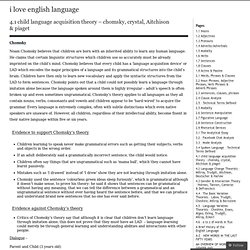
So what does this have to do with child language acquisition? David Crystal has the theory that children learn language in five stages, which aren’t clearly defined and some tie in with each other. These stages are: Stage One: This is where children say things for three purposes: To get something they wantTo get someone’s attentionTo draw attention to something Then they begin to make basic statements such as “daddy car” During this stage children begin naming things with single words and then move on to relating objects with other things, places and people, for example, “there mummy”. At this early stage they don’t have much vocabulary so they use intonation to ask a question.
Stage Two: This is when children usually ask questions, “where” questions come first. Stage Three: Stage Four: 1. Child language acquisition. Presentation (Transcript) Phonics/Pragmatics The developing language stage is also a blooming period for phonological and pragmatic language acquisition.
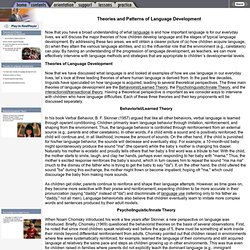
Thus, during this time, children acquire most of the phonological system. Further, between the ages of 3 and 5 they acquire an additional set of phonemes: /t, y, k, g, f, v, tS (ch), dZ (dg)/. Between the ages of 4 and 8, they acquire the last set of phonemes: /S (ch), T (th), s, z, I, r, Z (Gillam & Bedore, 2000). By the time children reach the age of 8, they complete their knowledge of the phonological system and add more complex phonological forms such as consonant clusters and blends (/sh/ in ship). Theories of Language Development. The Learning Perspective The Learning perspective argues that children imitate what they see and hear,and that children learn from punishment and reinforcement.
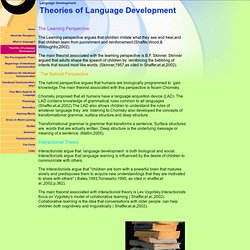
(Shaffer,Wood,& Willoughby,2002). The main theorist associated with the learning perspective is B.F. Skinner. Skinner argued that adults shape the speech of children by reinforcing the babbling of infants that sound most like words. The Nativist Perspective The nativist perspective argues that humans are biologically programmed to gain knowledge.The main theorist associated with this perspective is Noam Chomsky.
Chomsky proposed that all humans have a language acqusition device (LAD). Transformational grammar is grammar that transforms a sentence. Interactionist Theory Interactionists argue that language development is both biological and social. The main theorist associated with interactionist theory is Lev Vygotsky.Interactionists focus on Vygotsky's model of collaborative learning ( Shaffer,et al.,2002). Language and Cognition: Theories of Language Acquisition. The nature vs. nurture debate extends to the topic of language acquisition.
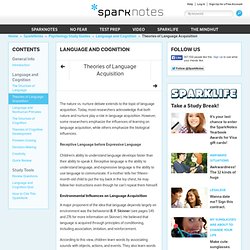
Today, most researchers acknowledge that both nature and nurture play a role in language acquisition. However, some researchers emphasize the influences of learning on language acquisition, while others emphasize the biological influences. Environmental Influences on Language Acquisition A major proponent of the idea that language depends largely on environment was the behaviorist B. F. According to this view, children learn words by associating sounds with objects, actions, and events.
Critics of this idea argue that a behaviorist explanation is inadequate. Learning cannot account for the rapid rate at which children acquire language.There can be an infinite number of sentences in a language. Language and Cognition (SparkNotes Psychology Guide Series) by SparkNotes Editors.